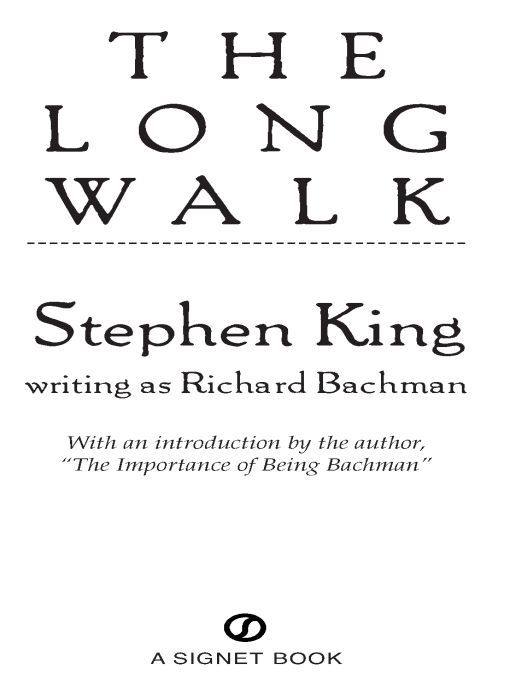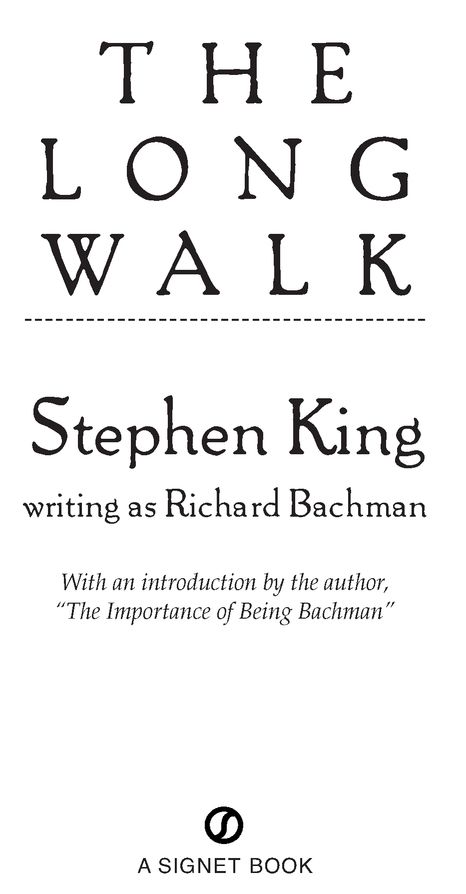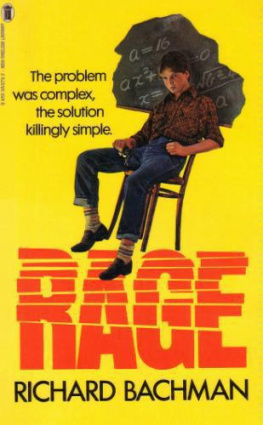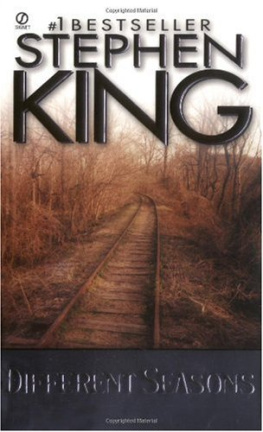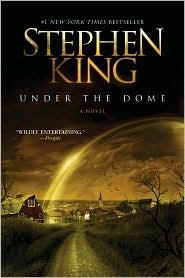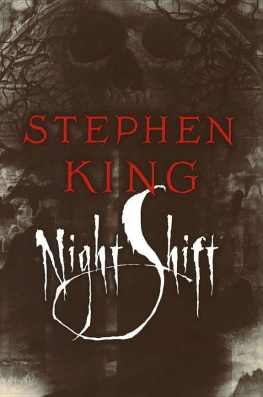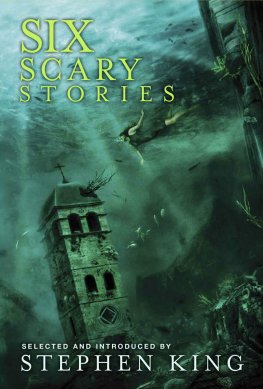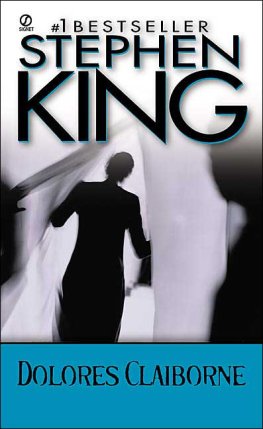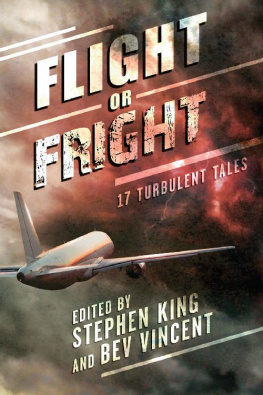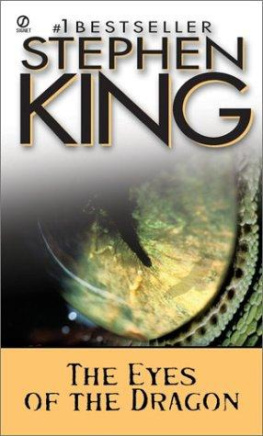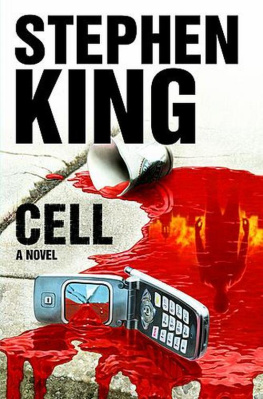Table of Contents
Only death can keep you from the finish linein the ultimate competition of the all-too-near future....
THE LONG WALK
Every year, on the first day of May, one hundred teenage boys meet for an event known throughout the country as The Long Walk. Among this years chosen crop is sixteen-year-old Ray Garraty. He knows the rules: that warnings are issued if you fall under speed, stumble, sit down. That after three warnings... you get your ticket. And what happens then serves as a chilling reminder that there can be only one winner in the Walkthe one that survives....
WORKS BY STEPHEN KING NOVELS
Carrie
Salems Lot
The Shining
The Stand
The Dead Zone
Firestarter
Cujo
THE DARK TOWER I:
The Gunslinger
Christine
Pet Sematary
Cycle of the Werewolf
The Talisman
(with Peter Straub)
It
Eyes of the Dragon
Misery
The Tommyknockers
THE DARK TOWER II:
The Drawing
of the Three
THE DARK TOWER III:
The Waste Lands
The Dark Half
Needful Things
Geralds Game
Dolores Claiborne
Insomnia
Rose Madder
Desperation
The Green Mile
THE DARK TOWER IV:
Wizard and Glass
Bag of Bones
AS RICHARD BACHMAN
Rage
The Long Walk
Roadwork
The Running Man
Thinner
The Regulators
COLLECTIONS
Night Shift
Different Seasons
Skeleton Crew
Four Past Midnight
Nightmares and
Dreamscapes
NONFICTION
Danse Macabre
SCREENPLAYS
Creepshow
Cats Eye
Silver Bullet
Maximum Overdrive
Pet Sematary
Golden Years
Sleepwalkers
The Stand
The Shining
The Importance of Being Bachman by Stephen King
This is my second introduction to the so-called Bachman Booksa phrase which has come to mean (in my mind, at least) the first few novels published with the Richard Bachman name, the ones which appeared as unheralded paperback originals under the Signet imprint. My first introduction wasnt very good; to me it reads like a textbook case of author obfuscation. But that is not surprising. When it was written, Bachmans alter ego (me, in other words) wasnt in what Id call a contemplative or analytical mood; I was, in fact, feeling robbed. Bachman was never created as a short-term alias; he was supposed to be there for the long haul, and when my name came out in connection with his, I was surprised, upset, and pissed off. Thats not a state conducive to good essay-writing. This time I may do a little better.
Probably the most important thing I can say about Richard Bachman is that he became real. Not entirely, of course (he said with a nervous smile); I am not writing this in a delusive state. Except... well... maybe I am. Delusion is, after all, something writers of fiction try to encourage in their readers, at least during the time that the book or story is open before them, and the writer is hardly immune from this state of... what shall I call it? How does directed delusion sound?
At any rate, Richard Bachman began his career not as a delusion but as a sheltered place where I could publish a few early works which I felt readers might like. Then he began to grow and come alive, as the creatures of a writer s imagination so frequently do. I began to imagine his life as a dairy farmer... his wife, the beautiful Claudia Inez Bachman... his solitary New Hampshire mornings, spent milking the cows, getting in the wood, and thinking about his stories... his evenings spent writing, always with a glass of whiskey beside his Olivetti typewriter. I once knew a writer who would say his current story or novel was putting on weight if it was going well. In much the same way, my pen-name began to put on weight.
Then, when his cover was blown, Richard Bachman died. I made light of this in the few interviews I felt required to give on the subject, saying that hed died of cancer of the pseudonym, but it was actually shock that killed him: the realization that sometimes people just wont let you alone. To put it in more fulsome (but not at all inaccurate) terms, Bachman was the vampire side of my existence, killed by the sunlight of disclosure. My feelings about all this were confused enough (and fertile enough) to bring on a book (a Stephen King book, that is), The Dark Half. It was about a writer whose pseudonym, George Stark, actually comes to life. Its a novel my wife has always detested, perhaps because, for Thad Beaumont, the dream of being a writer overwhelms the reality of being a man; for Thad, delusive thinking overtakes rationality completely, with horrific consequences.
I didnt have that problem, though. Really. I put Bachman aside, and although I was sorry that he had to die, I would be lying if I didnt say I felt some relief as well.
The books in this omnibus were written by a young man who was angry, energetic, and deeply infatuated with the art and craft of writing. They werent written as Bachman books per se (Bachman hadnt been invented yet, after all), but in a Bachman state of mind: low rage, sexual frustration, crazy good humor, and simmering despair. Ben Richards, the scrawny, pre-tubercular protagonist of The Running Man (he is about as far from the Arnold Schwarzenegger character in the movie as you can get), crashes his hijacked plane into the Network Games skyscraper, killing himself but taking hundreds (maybe thousands) of Free-Vee executives with him; this is the Richard Bachman version of a happy ending. The conclusions of the other Bachman novels are even more grim. Stephen King has always understood that the good guys dont always win (see Cujo, Pet Sematary, andperhapsChristine), but he has also understood that mostly they do. Every day, in real life, the good guys win. Mostly these victories go unheralded (MAN ARRIVES HOME SAFE FROM WORK YET AGAIN wouldnt sell many papers), but they are nonetheless real for all that... and fiction should reflect reality.
And yet...
In the first draft of The Dark Half, I had Thad Beaumont quote Donald E. Westlake, a very funny writer who has penned a series of very grim crime novels under the name Richard Stark. Once asked to explain the dichotomy between Westlake and Stark, the writer in question said, I write Westlake stories on sunny days. When it rains, Im Stark. I dont think that made it into the final version of The Dark Half, but I have always loved it (and related to it, as it has become fashionable to say). Bachmana fictional creation who became more real to me with each published book which bore his bylinewas a rainy-day sort of guy if ever there was one.
The good folks mostly win, courage usually triumphs over fear, the family dog hardly ever contracts rabies: these are things I knew at twenty-five, and things I still know now, at the age of 25 X 2. But I know something else as well: theres a place in most of us where the rain is pretty much constant, the shadows are always long, and the woods are full of monsters. It is good to have a voice in which the terrors of such a place can be articulated and its geography partially described, without denying the sunshine and clarity that fill so much of our ordinary lives.
In Thinner, Bachman spoke for the first time on his ownit was the only one of the early Bachman novels that had his name on the first draft instead of mineand it struck me as really unfair that, just as he was starting to talk with his own voice, he should have been mistaken for me. And a mistake was just what it felt like, because by then Bachman had become a kind of id for me; he said the things I couldnt, and the thought of him out there on his New Hampshire dairy farmnot a best-selling writer who gets his name in some stupid

